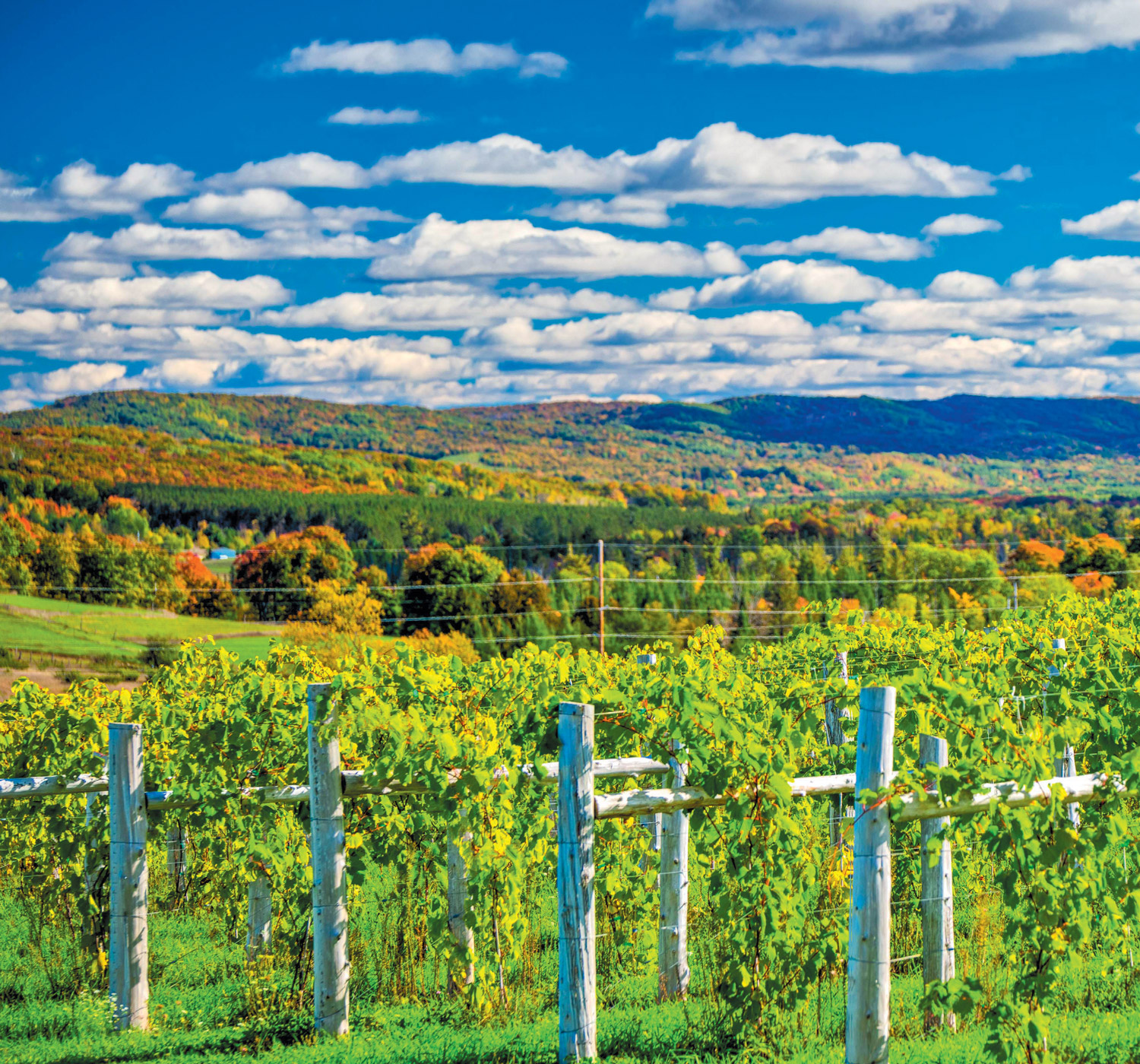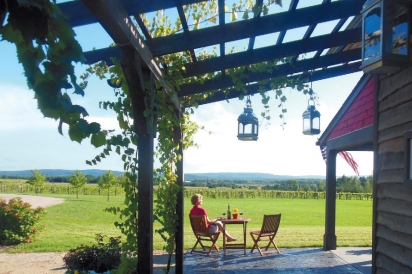Love of Land, Lake and Vine
Cool breezes from Little Traverse Bay follow the rolling hills east, inland across fertile farmland, blooming orchards, busy bike trails and docks where fishing boats come and go. During winter this mild breeze turns to a harsh, lake-effect blast that, together with chilling wind that blows down from the Straits of Mackinac, wraps this landscape in a blanket of deep snow.
New acreages of wine grapes have been planted on these exposed hills and winemakers are embracing the unique opportunity to cultivate varietals that typically can’t withstand the harsh conditions elsewhere. Winemakers here are excitedly planting hybrid varietals—such as the Marquette grape—which represent new standards in cold-hardy viticulture and enology.
Twelve family-owned and -operated wineries in the area have joined forces to nurture these standards, their businesses and the growth of local wine tourism with a new brand name: the Petoskey Wine Region. Formerly known as the Bay View Wine Trail, the change reflects the region’s numerous award-winning wines both nationally and internationally, its significant growth in the number of wineries and the awarding of Michigan’s first AVA (American Viticulture Area) in over 30 years, called Tip of the Mitt. This prestigious AVA designation was awarded for the area’s new varieties of quality grapes— known for their European heritage and ability to survive harsh winters.
Vickie Wysokinski is the grant administrator for the Petoskey Wine Region and owns Rudbeckia Winery and Burnt Marshmallow Brewing located on 190 acres in Petoskey with views of Lake Michigan and Walloon Lake. She explains the wonder of the Marquette grape, which happily grows there and is being cultivated by her fellow winemakers in the region.
“A grandson of Pinot Noir, this selection sets a new standard in cold-hardy wine grapes. The wine is very complex with black currant, cherry, black pepper and spice in the aroma profile and moderate tannins,” says Wysokinski. “This is an excellent choice for medium-bodied dry red wine, but can also be blended or make very good rosé.”
Rudbeckia Winery’s 2018 Marquette Dry Rosé won silver medals in two different international wine competitions and a gold medal in the Michigan Wine Competition.
The region’s first winery, founded in 2004 in Manistique, moved to a sophisticated facility in Petoskey seven years ago. The Mackinaw Trail Winery now creates wine from grapes grown on 15 acres north of the 45th parallel. “The Marquette and Petite Pearl produce deep ruby-colored wines, light but firm tannins, balancing acidity, lots of fruit, in a light- to medium-bodied wine,” says owner Ralph Stabile.
Spare Key Winery near Charlevoix planted 200 Marquette grapevines in 2011 and now has 1,200 vines with plans to continue to expand this variety. “Our winemaker, Joel Robinson, is excited to use Marquette grapes to make wine that is very fruit- forward with mulberry, plus earthy undertones and a light oak, all from the grape skin,” says Jean McCarthy at Spare Key, one of the few fully estate grown and bottled wineries in Northern Michigan, where wines are made from grapes grown in their vineyard and processed on the property.
A deep love and understanding of the land will likely produce memorable wines. “We want people to taste our vineyard, not just the winemaking process. We call it ‘hands off wine,’” says Geoff Fry. He and his wife, Gail, own Crooked Vine Vineyard and Winery, 38 acres in Alanson just north of Petoskey. “We let the grapes speak for themselves. Our focus is on growing quality wine grapes that are new to the marketplace in Michigan’s newest American Viticultural Area (AVA)—Tip of the Mitt. The first AVA in Michigan in 30 years.”
Established in August 2016, the Tip of the Mitt is the latest of five federally recognized AVAs in Michigan, on a list that includes Old Mission Peninsula, Leelanau Peninsula, Fennville and Lake Michigan Shore. Michigan’s wine industry is a significant economic contributor to the state, with more than $5.4 billion in total economic impact. It affects many sectors including tourism, retail and jobs. Michigan wineries receive 1.7 million visits each year, and contribute to more than $252 million in tourism spending. The winemakers in the Petoskey Wine Region recognize the potential; more than that, they are embracing their terroir and working hard to make the Northern Michigan wine tasting experience accessible and unforgettable.
Bright tasting rooms overlooking verdant pastures and never-ending lakes at these family-owned wineries offer a grand summer afternoon. The Cellars at Royal Farms in adorable Ellsworthis also a cidery, and is proud to be a part of the Petoskey Wine Region. Their trendy farmhouse- feel tasting room has spectacular views of the orchards, vineyards and Lake Michigan from patios and a wine garden where award-winning wines and heirloom ciders are served.
“We love to share our farm with you,” says Marci Spencer at the 200-acre Pond Hill working farm in Harbor Springs. Estate- grown wine and local beer are served in the café and beer garden and guests can stroll the expansive terraced vineyard, pet animals in the barn and shop locally at the farm market. The experience is paramount.
At Rudbeckia Winery, tasting room staff are certified wine educators with over 25 years of international knowledge in wine and beer and pour fresh wine every day either by newly opened bottles or by using the RePour preservation system. “We invite guests to walk through our vineyards, compete in a game of Bocce on our regulation court, enjoy a game of corn hole, or fly a kite in our 190 acres of open fields,” says Wysokinski, who is harvesting estate Marquette for this first time this year.
Todd Chinnock is general manager and sommelier at Pour Kitchen and Bar in downtown Petoskey. Among his regulars are winemakers who stop in to talk shop. “These winemakers are so knowledgeable and passionate,” says Chinnock. “When visitors ask about local wine, I encourage them to take advantage of the region and meet these dedicated people, taste their wine.”
Planting two feet on the land where the grapes are grown takes wine tasting to the next level. “Understanding the context of the wine you’re drinking, meeting the people behind what’s in the bottle and seeing the vines is a unique and valuable experience,” he says.






